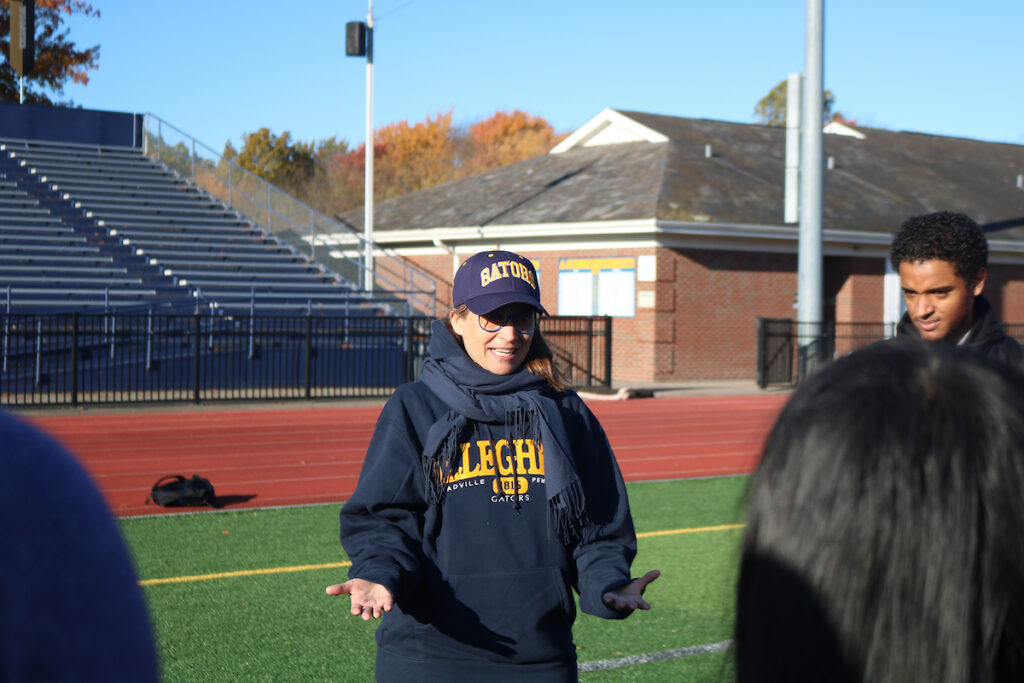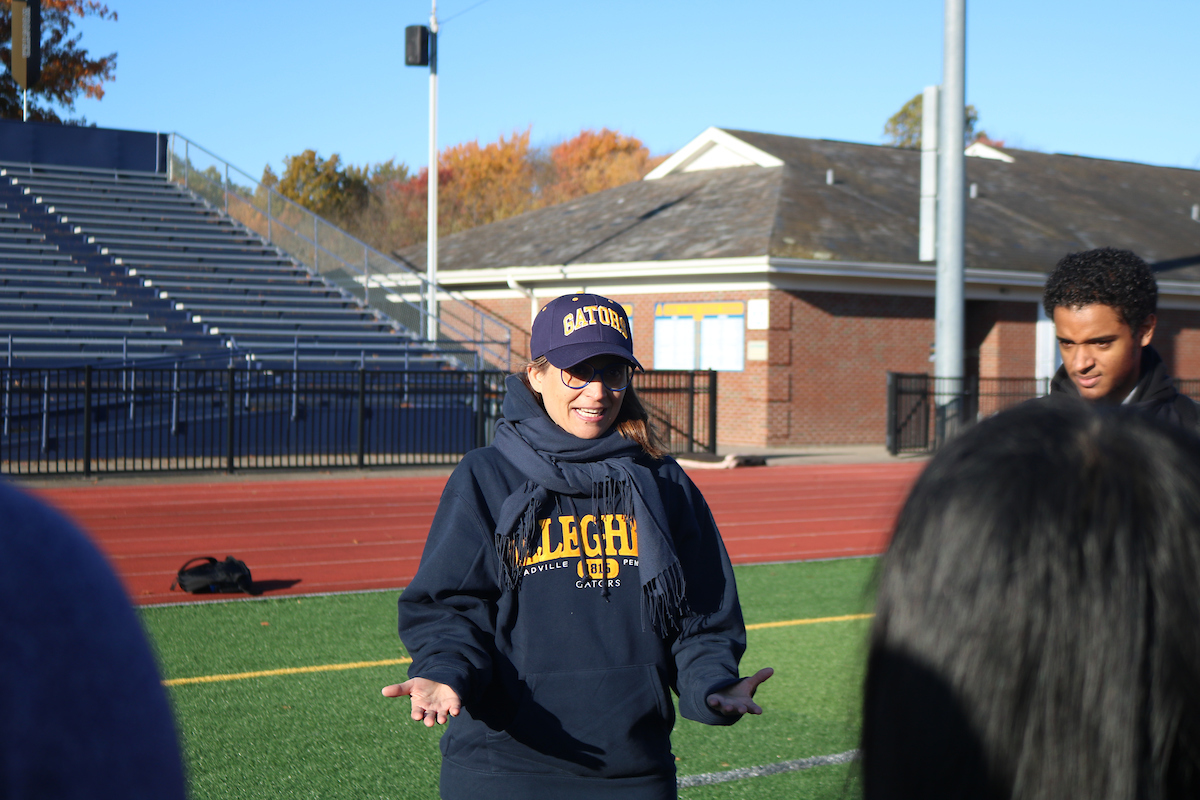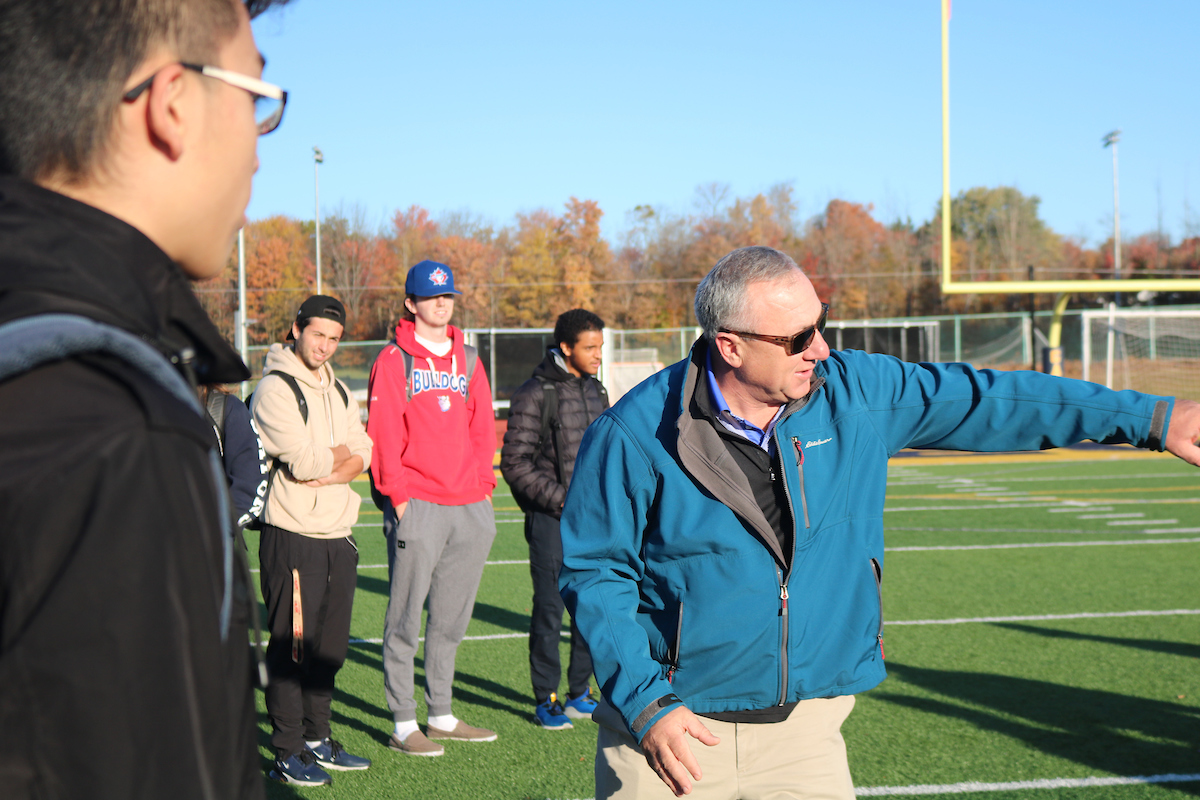
Gaia Rancati, an assistant professor of marketing and neuromarketing who hails from Italy, attended her first-ever American-style football game at Allegheny College in September 2019 and was intrigued by the amount of strategy and hierarchical organization she saw playing out on the field.
“I was surprised by the number of players and assistant coaches, and I thought to myself, the head coach must have to be a good manager just like in a successful business,” she said. “I could also see that there was a lot of strategic planning going into the game.”

Allegheny Professor Gaia Rancati relates the strategies of football to the business world for students in her Economics 240 class. Photo Credits: Top Photo: Liam Michel; Photo above and below: Sydney Emerson
A week later, Rancati called Allegheny Head Football Coach Rich Nagy to see if he was interested in sharing his expertise with her Introduction to Managerial Economics class.
Nagy, in his first year as head coach of the Gators, was more than happy to oblige and agreed to speak to Rancati’s Economics 240 students about his decision-making processes as they pertain to recruitment, on-field strategy and personnel management.
“Football really functions as a business model. A head football coach’s job is to run the organization,” said Nagy. “And when you think of it, recruiting players is all about sales and marketing. When we talked about it, it was amazing how much crossover there is” between competitive athletics and overseeing a business, he said.
“In football, we are in the people business,” said Nagy. “There is a chain of command, just like in any successful company. There are different managerial styles, and there’s a sales model for recruitment. The product side comes out on the field.”
Said Rancati: “In class, we discuss how companies recruit people, about their competitive strategies, and about how they motivate employees. It’s basically the same model. In business, we call it employer branding.”
That especially applies to Allegheny’s recruitment strategy since the College has a quality brand for student-athletes, Nagy said. “I talked to the class about recruiting athletes. We’re looking for talented people who will fit in at Allegheny, people we think we can develop as students and as athletes,” he said.
In the business world, recruitment is known as the “war of talents,” where companies try to lure the best and brightest critical thinkers and industrious workers to join them, Rancati said.
And like major companies, football coaches try to bring to the team players with sound character, added Nagy. “I’ve learned you can recruit your own problems,” he said. For instance, he carefully watches family interactions when he’s on recruiting visits, Nagy said. “If they’re showing disrespect for their mother or father, they’re probably going to be doing the same thing to me,” he said.

Allegheny Head Football Coach Rich Nagy explains some football nuances to visiting economics students.
Added Rancati: “In football and in business, recruiters are trying to match the values of the person to the values of the school or the company.”
It’s also true that in football and the business world, managers and coaches have to groom front-line players, Rancati said. “You have stars in football and you have stars in business, and every year, you lose some of them, so you are continually developing talent,” she said.
Trust also is crucial on the playing field and in corporate offices, Rancati said. “Trust is the keyword,” she said. “You can’t play well in a game if you don’t have trust in the coaches and other players. The same applies to co-workers in the business world.”
Team captain and economics student Zachary Wilson, a senior from Mars, Pennsylvania, talked about the insight he has gained from the class: “I never really made a connection with football and business strategy until Dr. Rancati showed me that they basically have the same ideology. Looking at the bigger picture of business and football, it is important to understand that every level of the business needs to do their part in order for the firm to be successful. This relates directly to football because each person out of the 11 on the field needs to do their individual job for the desired outcome.”
Rancati said 11 of her 25 students in Economics 240 are student-athletes, including four football players and two students who work as a trainer and an equipment manager for the football team. “I was able to see these students from a different perspective,” Rancati said. “It’s important that teachers see students in their athletic roles and for coaches to see students in their academic settings — the message being that we care about you as a person.”
“I tell my coaches that if you’re going to be involved, you have to be all in,” said Nagy. “I know I have to be involved in academics. It’s important for coaches to attend student presentations on campus. I tell the players, you are going to Allegheny College for a reason, and it’s not just football.”
Two weeks after the coach addressed the economics class, Rancati took the group to the Gators practice field to observe and participate in football drills, even running some plays as a unit on both sides of the ball. “Business and economics are more than book learning. You have to experience it in your daily interactions,” said Rancati, who has been named an honorary “faculty captain” for the 2019 season.
Rancati and Nagy said they plan to continue the collaboration for future classes.
“Using football as a teaching metaphor works. The game of football and the marketing and business arenas have a lot in common,” said Rancati. “It’s important to look outside of the box to gain that competitive advantage.”


